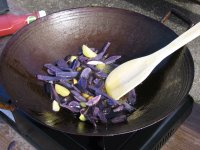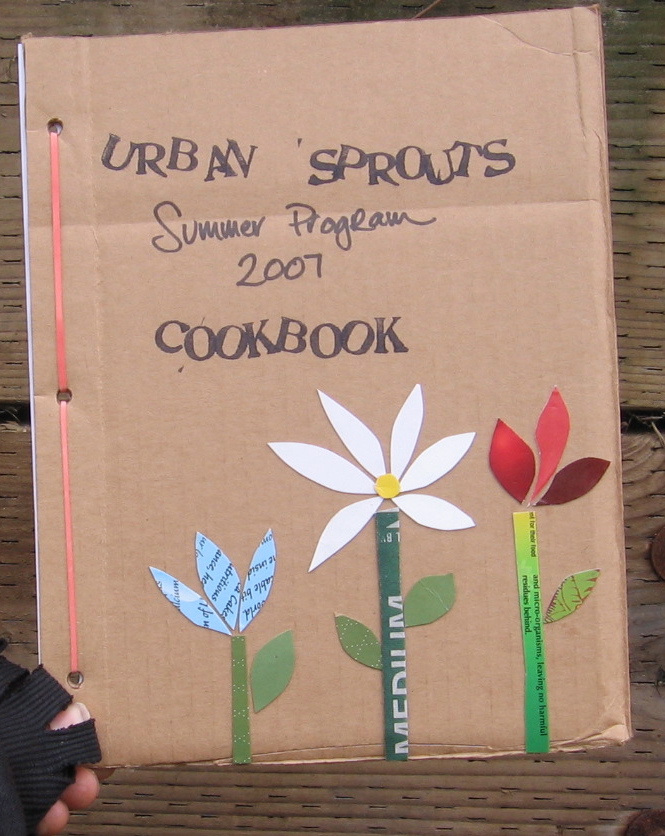 Today guest chef-educators Megan and Rania came from NextCourse to do a lesson. We had a great day! As Megan led the lesson, I had fun getting to sit back and be part of the crowd, helping students to stay quiet and participate, but also getting to chat and joke with them while the group was eating and learning together. Getting to enjoy my connection with the students, rather than being the ringmaster directing traffic up on stage. Especially with students who have stayed for after school, I appreciated how familiar they are with me, trusting me. Today I could give them individualized roles, when individuals had trouble with the group assignment, and be thoughtful and careful because I wasn’t under the stress of having to manage the whole group of 30 alone. Having over 6 adults made the biggest difference.
Today guest chef-educators Megan and Rania came from NextCourse to do a lesson. We had a great day! As Megan led the lesson, I had fun getting to sit back and be part of the crowd, helping students to stay quiet and participate, but also getting to chat and joke with them while the group was eating and learning together. Getting to enjoy my connection with the students, rather than being the ringmaster directing traffic up on stage. Especially with students who have stayed for after school, I appreciated how familiar they are with me, trusting me. Today I could give them individualized roles, when individuals had trouble with the group assignment, and be thoughtful and careful because I wasn’t under the stress of having to manage the whole group of 30 alone. Having over 6 adults made the biggest difference.Megan did a great lesson, focusing on the difference between whole foods and processed foods. She had examples of both for students to see, like potatoes and chips, real oats and cereal, milk and ice cream. Then she led an exercise that led students along the path an orange takes from a local farm to homemade juice, versus from an overseas farm to the processing plant to bottled orange juice in the store. The students did a great job of paying attention and participating.
First, Megan asked the group about the garden, about what they’ve been growing there and how they’ve been growing it. It was great to see how much the students had to say. They talked about how they have improved the soil with compost and wood chips, and by weeding and watering. They mentioned all kinds of critters we’ve seen (snails, gophers, worms) and foods we’ve tasted (mint, strawberries, potatoes).
 Lastly, Megan and Rania led the students in squeezing orange juice and mixing up salsa from fresh ingredients. While the students helped making food, they told Rania about the foods they’ve made. Tyrell told her how he made the French fries at the garden party. Before we went outside he even asked me, “Are we going to cook in a wok?” Megan also remarked that they have learned so much, about the garden and the food in it, and that all the being, doing and connecting in the garden teach much more than words can get across.
Lastly, Megan and Rania led the students in squeezing orange juice and mixing up salsa from fresh ingredients. While the students helped making food, they told Rania about the foods they’ve made. Tyrell told her how he made the French fries at the garden party. Before we went outside he even asked me, “Are we going to cook in a wok?” Megan also remarked that they have learned so much, about the garden and the food in it, and that all the being, doing and connecting in the garden teach much more than words can get across.It’s amazing to see the evidence in action. These are young people who, without thinking twice, buy chips and soda at the store every day. These same students are talking all about organic food, about cooking with woks, harvesting potatoes and mint, and getting exciting about it. This is clearly a shift in attitudes and beliefs, and in preferences. They are tasting and eating whole foods. They haven’t yet made the change in behavior overall, but they make smaller choices every day when they choose to eat from the garden and tell others about it. Megan said one of her students made his own choice to throw out his bag of Cheetos when he came to her class.
As teachers, we worry so much that the students are getting “enough” curriculum on every subject we want them to learn all about. But the most significant thing I ever learned in school was how to learn for myself: how to think, how to ask questions, and how to find out the answers myself. In the garden, students watch a plant grow and fruit, or watch a plant die as it gets dragged down a gopher hole or munched by snails. These things teach the students so much more than any curriculum, no matter how interactive.
school garden
whole food
organic food
youth
nutrition education
food systems









2 comments:
Hi Abby,
I linked here from the nice comment you left today on my blog, Farmgirl Fare. I think what you are doing with these young people is absolutely fabulous. Reading this post literally brought tears of joy to my eyes. They are so lucky to be involved a program like this--and to have you. Thank you for everything you are doing.
P.S. I love the name 'Urban Sprouts!' : )
Post a Comment